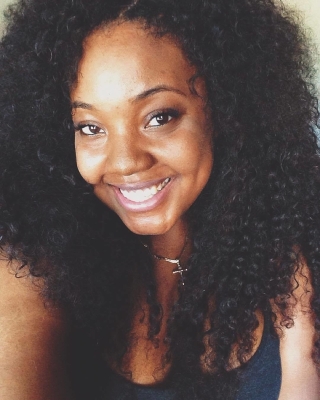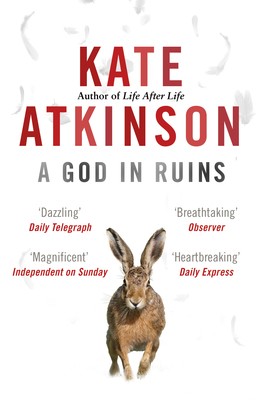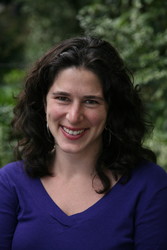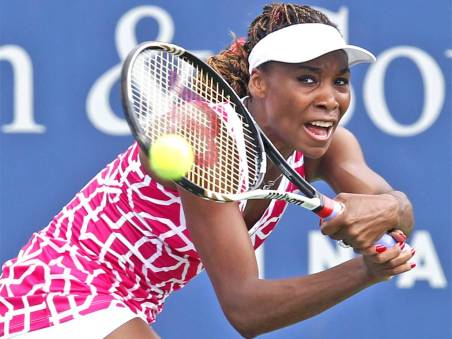In the media is a fortnightly round-up of features written by, about or containing female writers that have appeared during the previous fortnight and I think are insightful, interesting and/or thought provoking. Linking to them is not necessarily a sign that I agree with everything that’s said but it’s definitely an indication that they’ve made me think. I’m using the term ‘media’ to include social media, so links to blog posts as well as as traditional media are likely and the categories used are a guide, not definitives.

Post-election coverage is still top of the tree this fortnight:
- Lauren Duca, ‘Donald Trump Is Gaslighting America‘ in Teen Vogue
- Jennifer Gonnerman, ‘Fighting for the Poor Under Trump‘ in The New Yorker
- Molly Ball, ‘President Trump’s Perpetual Campaign‘ in The Atlantic
- Chimamanda Ngozi Adichie, ‘Now Is the Time to Talk About What We Are Actually Talking About‘ in The New Yorker
- Barbara Robidoux, ‘Walk On‘ on The Rumpus
- Hadley Freeman, ‘“Don’t play identity politics!” The primal scream of the straight white male‘ in The Guardian
- Masha Gessen, ‘Trump: The Choice We Face‘ in The New York Review of Books
- Gabrielle Bellot, ‘Finding Empathy in the Face of Hate‘ on Literary Hub
- Alison Stine, ‘Wolves‘ on The Rumpus
The other big story has been the revelation that Maria Schneider was raped in Last Tango in Paris:
- Sali Hughes, ‘The callous abuse of Maria Schneider, and the impunity of Hollywood men‘ on The Pool
- Suzanne Moore, ‘Last Tango’s abuse reveals the broken promise of the 1970s sexual revolution‘ in The Guardian
- Helen Lewis, ‘Maria Schneider’s story is no surprise – Hollywood has always treated women as commodities‘ in the New Statesman
- Jessica Tovey, ‘Bertolucci’s justification for the Last Tango rape scene is bogus. It’s called ‘acting’ for a reason‘ in The Guardian

The best of the rest:
On or about books/writers/language:
- Rave Sashayed, On men writing women on but alas! the creature grows degenerate
- Sarah Perry, ‘One day I found myself reciting the opening of the novel. I knew the crisis had come’ in The Guardian
- Zadie Smith, ‘On Optimism and Despair‘ in The New York Review of Books
- G X Todd, ‘Insecurity, fear, frustration and helplessness‘ in The Bookseller
- Amanda Nadelberg, ‘How Do We Pay the Poets?‘ on Literary Hub
- Jesmyn Ward, ‘This Was The Year America Finally Saw The South‘ on Buzzfeed
- Kelly Faircloth, ‘The Sweet, Savage Sexual Revolution That Set the Romance Novel Free‘ on Jezebel
- Ellena Savage, ‘From Hemingway to Kathy Acker: Making Art from the Outside‘ on Literary Hub
- Amanda Michalopoulou, ‘Divided times: how literature teaches us to understand “the other”‘ in The Guardian
- Lamorna Ash, ‘Never mind the typography‘ in The TLS
- Marcy Dermansky, ‘For Writers who Are Also the Mothers of Small Children‘ on Literary Hub
- Chantal Braganza, ‘A User’s Guide to Zadie Smith‘ on Hazlitt
- Miriam Toews, ‘How Pacifism Can Lead to Violence and Conflict‘ on Literary Hub
- Nicole Jankowski, ‘Ernest Hemingway and Me: Reflections of an Insomniac Writer‘ on Catapult
- Katharine Noel, ‘Where Is All the Sibling Literature for Adults?‘ on Literary Hub
- Michael Denneny, ‘Ntozake Shange: On a Brilliant Balance of Anger and Poetry‘ on Literary Hub
- Rafia Zakaria, ‘A Feminist Thoreau‘ on Literary Hub
- Dan Chiasson, ‘Emily Dickinson’s Singular Scrap Poetry‘ in The New Yorker
- Petina Gappah, ‘I was a lawyer, but I forced myself to write before I went to work’ in The Guardian
- Clare Sestanovich, ‘Storytelling vs. Oversharing in the Age of Snapchat: On the Work of Rachel Cusk, Claire Louise-Bennett, and Eimear McBride‘ on Literary Hub
- Sarah Franklin, ‘Lose yourself in the microworld of the short story‘ on The Pool

Personal essays/memoir:
- Courtney Tenz, ‘Integration Class: On Immigrating to Germany‘ on Catapult
- Lisbeth Zornig Andersen, ‘When Denmark Criminalised Kindness‘ in Granta
- Megan Cummins, ‘Plunge‘ on Guernica
- Jacklyn Janeksela, ‘lane-gweedj‘ on [Pank]
- Antonia Honeywell’s Advent Calendar on her blog
- Yemisi Aribsala ‘Kanda for Christmas‘ on The Writes of Woman
- Linda Wells, ‘Spas Aren’t Only About Beauty, Vanity, or Fun. They’re Also About Grief.‘ on The Cut
- Maureen McCauley Evans, ‘A New Light: How My Daughter’s Pregnancy Made Me Rethink Adoption‘ on Catapult
- Amy Beth Wright, ‘A Separate Dream: Faith, Family, and Knowing When to Let Go‘ on Catapult
- Helena Fitzgerald, ‘Leaving on a Jet Plane: On Life in Airports and Coming Home‘ on Catapult
- Jennifer Kabat, ‘The Fairytale‘ on Granta
- Sarah Weinman, ‘The Year in Addition and Subtraction‘ in Hazlitt
- Kim Fu, ‘The Year in Hyphenates‘ in Hazlitt
- Meg Elison, ‘On Decades of Diaries: Intimate, Profane, Honest‘ on Literary Hub
- Christine Sneed, ‘“It’s very easy to marry, but not so easy to unmarry a person”‘ on The Pool
- Various, ‘Conversations with grandma: ‘When are you going to get married?’‘ in The Guardian
- Anonymous, ‘The Discovery‘ on Finally Knowing Me

Feminism:
- Sirin Kale, ‘The Irish Government Is Seizing an Increasing Number of Abortion Pills‘ on Broadly
- Alanna Evans, ‘One Delightfully Clever & Slightly Shakespearean Way to Fight Trolls‘ on Flare
- Soraya Chemaly, ‘How white supremacist hatred drives acts of violence against powerful women‘ on Salon
- Wanu Udobang, ‘Remembering to Scream‘ on Brittle Paper
- Pearl Osibu, ‘The Unwomanly Feminist‘ on Brittle Paper
- Paris Lees, ‘Fears around gender-neutral toilets are all in the mind‘ in The Guardian
- Various, ‘Four female writers assess the feminist credentials of classic Disney princess films‘ in Stylist
- Ashley Weatherford, ‘The Irrational History of Hating Stretch Marks‘ in The Cut
- Margaret Talbot, ‘The Attorney Fighting Revenge Porn‘ in The New Yorker
- Laura Craik, ‘“It’s OK to allow women to look sexy without baring a breast”‘ on The Pool

Society and Politics:
- Rosalind Adams, ‘Intake: Locked On The Psych Ward‘ on Buzzfeed
- Samira Shackle, ‘40 years ago, the “strikers in saris” were smashing the stereotype of submissive Asian women‘ on The Pool
- Samira Shackle, ‘Muslim women are facing discrimination – and broad reports about “integration” won’t help that‘ on The Pool
- Caroline O’Donoghue, ‘Is it OK to have a single-use friendship?‘ on The Pool
- Tele Ogunyemi, ‘We are not “belligerent,” “dark” or “bitter”‘ on Media Diversified
- Marina Hyde, ‘So many lowlights from the life of Zac Goldsmith – so hard to choose‘ in The Guardian
- Erika Hayasaki, ‘Traces of Times Lost‘ in The Atlantic
Film, Television, Music, Art, Fashion and Sport:
- Leslie Bennetts, ‘Judge Me, Rank Me, Insult Me, Reject Me: The Contradictions, Cruelty and Genius of Joan Rivers‘ on Lenny

The interviews/profiles:
- Chimamanda Ngozi Adichie in The Cut and The New York Times
- Ali Smith on the Penguin Blog
- Brit Bennett on Electric Literature
- Eileen Myles, Ruth Ozeki, Porochista Khakpour, Anna March and Alexandra Kleeman on Writing the Body on Literary Hub
- Imbolo Mbue on The Rumpus
- Jessie Greengrass on The Writes of Woman
- Val McDermid on Literary Hub
- Eimear McBride in The TLS
- Jia Tolentino on Catapult
- Danielle Dutton on The Millions
- Mary Gaitskill on The Pool
- Zadie Smith in the New Statesman
- Mary Wisniewski on Electric Literature
- Henrietta Rose-Innes on Electric Literature
- Elizabeth Gilbert in The Cut
- Yemisi Aribisala on The Tiger Tales, Chukus and Kitchen Butterfly
- Hao Jingfang in The New York Times
- Erin Wunker on Room
- Heather Phillipson in The Guardian
- Sarah Perry on Waterstones’ blog

The regular columnists:
- Laurie Penny in The New Statesman
- Lucy Mangan in Stylist
- Roxane Gay in The Guardian US
- Yasmin Alibhai-Brown in The Independent
- Caitlin Moran in The Times
- Lauren Laverne in The Pool
- Ella Risbridger in The Pool
- Sali Hughes in The Pool
- Bim Adewunmi in The Guardian
- Sophie Heawood in The Guardian
- Eva Wiseman in The Observer
- Tracey Thorn in The New Statesman
- Chimene Suleyman and Maya Goodfellow on Media Diversified
- Josie Pickens on Ebony
- Bridget Christie in The Guardian
- Lizzy Kremer on Publishing for Humans
- Juno Dawson in Glamour
- Kashana Cauley on Catapult
- Louise O’Neill in the Irish Examiner
- Jendella Benson on Media Diversified
- Lola Okolosie in The Guardian
- Sarah Gerard, ‘Mouthful‘ on Hazlitt
- Books by Women We’d Love to See in English on Literary Hub

























